Martin Luther's Contribution to Church History and Reformation
VerifiedAdded on 2021/12/04
|6
|1454
|195
Essay
AI Summary
This essay provides a comprehensive overview of Martin Luther's profound impact on church history. It begins by detailing Luther's life, from his early aspirations to his pivotal role in the Reformation movement. The essay highlights his discontent with the practices of the Roman Catholic Church, particularly the sale of indulgences, which led to the creation and dissemination of his 95 Theses. It explores the key arguments presented in the theses, the reactions of the Church, and Luther's subsequent excommunication. Furthermore, the essay analyzes Luther's contributions to the rise of Protestantism and the lasting effects of the Reformation, including the freedom of biblical interpretation and the establishment of various Christian denominations. The conclusion emphasizes Luther's enduring significance as a central figure in religious history, whose actions reshaped the Christian world and continue to influence it today.
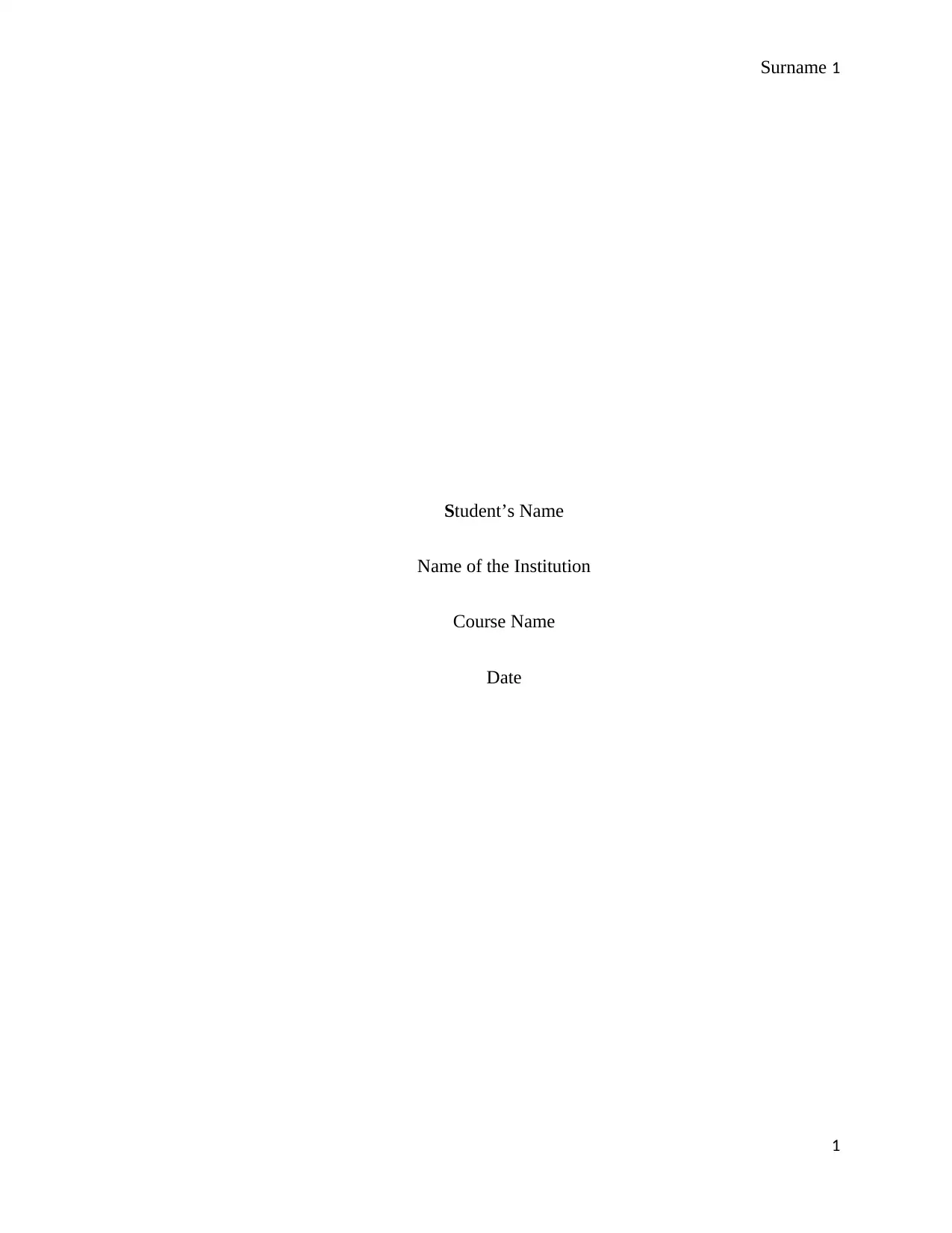
Surname 1
Student’s Name
Name of the Institution
Course Name
Date
1
Student’s Name
Name of the Institution
Course Name
Date
1
Paraphrase This Document
Need a fresh take? Get an instant paraphrase of this document with our AI Paraphraser
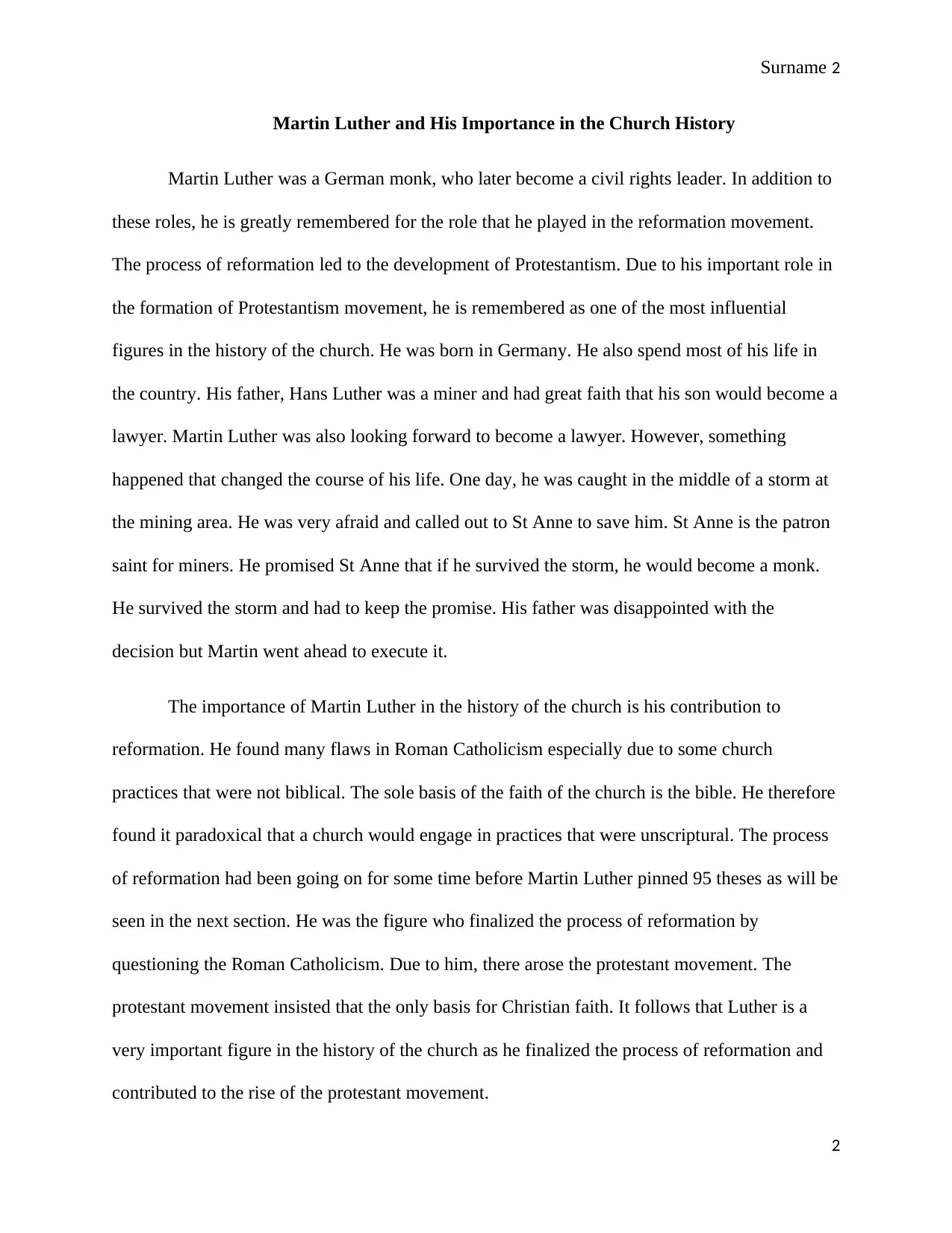
Surname 2
Martin Luther and His Importance in the Church History
Martin Luther was a German monk, who later become a civil rights leader. In addition to
these roles, he is greatly remembered for the role that he played in the reformation movement.
The process of reformation led to the development of Protestantism. Due to his important role in
the formation of Protestantism movement, he is remembered as one of the most influential
figures in the history of the church. He was born in Germany. He also spend most of his life in
the country. His father, Hans Luther was a miner and had great faith that his son would become a
lawyer. Martin Luther was also looking forward to become a lawyer. However, something
happened that changed the course of his life. One day, he was caught in the middle of a storm at
the mining area. He was very afraid and called out to St Anne to save him. St Anne is the patron
saint for miners. He promised St Anne that if he survived the storm, he would become a monk.
He survived the storm and had to keep the promise. His father was disappointed with the
decision but Martin went ahead to execute it.
The importance of Martin Luther in the history of the church is his contribution to
reformation. He found many flaws in Roman Catholicism especially due to some church
practices that were not biblical. The sole basis of the faith of the church is the bible. He therefore
found it paradoxical that a church would engage in practices that were unscriptural. The process
of reformation had been going on for some time before Martin Luther pinned 95 theses as will be
seen in the next section. He was the figure who finalized the process of reformation by
questioning the Roman Catholicism. Due to him, there arose the protestant movement. The
protestant movement insisted that the only basis for Christian faith. It follows that Luther is a
very important figure in the history of the church as he finalized the process of reformation and
contributed to the rise of the protestant movement.
2
Martin Luther and His Importance in the Church History
Martin Luther was a German monk, who later become a civil rights leader. In addition to
these roles, he is greatly remembered for the role that he played in the reformation movement.
The process of reformation led to the development of Protestantism. Due to his important role in
the formation of Protestantism movement, he is remembered as one of the most influential
figures in the history of the church. He was born in Germany. He also spend most of his life in
the country. His father, Hans Luther was a miner and had great faith that his son would become a
lawyer. Martin Luther was also looking forward to become a lawyer. However, something
happened that changed the course of his life. One day, he was caught in the middle of a storm at
the mining area. He was very afraid and called out to St Anne to save him. St Anne is the patron
saint for miners. He promised St Anne that if he survived the storm, he would become a monk.
He survived the storm and had to keep the promise. His father was disappointed with the
decision but Martin went ahead to execute it.
The importance of Martin Luther in the history of the church is his contribution to
reformation. He found many flaws in Roman Catholicism especially due to some church
practices that were not biblical. The sole basis of the faith of the church is the bible. He therefore
found it paradoxical that a church would engage in practices that were unscriptural. The process
of reformation had been going on for some time before Martin Luther pinned 95 theses as will be
seen in the next section. He was the figure who finalized the process of reformation by
questioning the Roman Catholicism. Due to him, there arose the protestant movement. The
protestant movement insisted that the only basis for Christian faith. It follows that Luther is a
very important figure in the history of the church as he finalized the process of reformation and
contributed to the rise of the protestant movement.
2
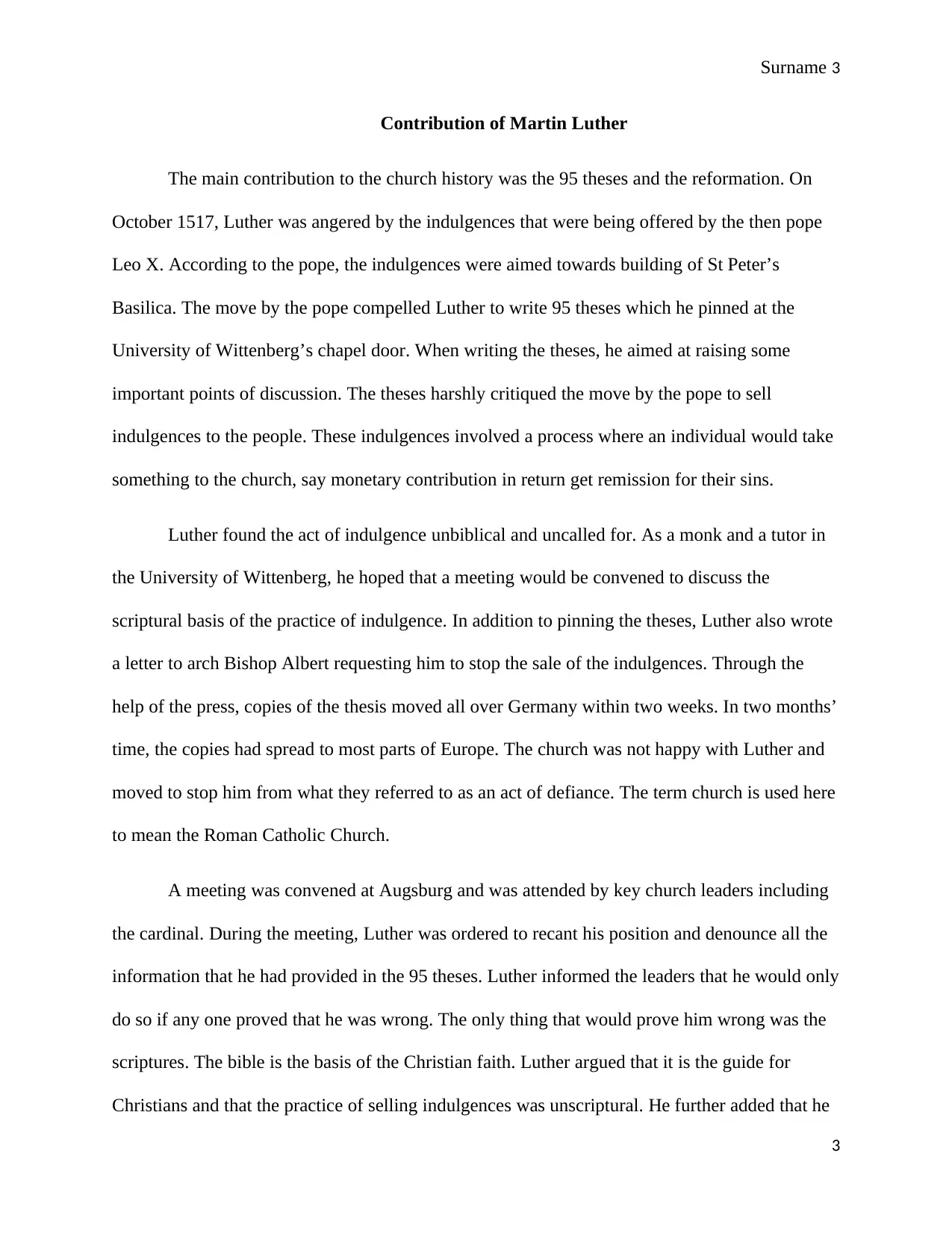
Surname 3
Contribution of Martin Luther
The main contribution to the church history was the 95 theses and the reformation. On
October 1517, Luther was angered by the indulgences that were being offered by the then pope
Leo X. According to the pope, the indulgences were aimed towards building of St Peter’s
Basilica. The move by the pope compelled Luther to write 95 theses which he pinned at the
University of Wittenberg’s chapel door. When writing the theses, he aimed at raising some
important points of discussion. The theses harshly critiqued the move by the pope to sell
indulgences to the people. These indulgences involved a process where an individual would take
something to the church, say monetary contribution in return get remission for their sins.
Luther found the act of indulgence unbiblical and uncalled for. As a monk and a tutor in
the University of Wittenberg, he hoped that a meeting would be convened to discuss the
scriptural basis of the practice of indulgence. In addition to pinning the theses, Luther also wrote
a letter to arch Bishop Albert requesting him to stop the sale of the indulgences. Through the
help of the press, copies of the thesis moved all over Germany within two weeks. In two months’
time, the copies had spread to most parts of Europe. The church was not happy with Luther and
moved to stop him from what they referred to as an act of defiance. The term church is used here
to mean the Roman Catholic Church.
A meeting was convened at Augsburg and was attended by key church leaders including
the cardinal. During the meeting, Luther was ordered to recant his position and denounce all the
information that he had provided in the 95 theses. Luther informed the leaders that he would only
do so if any one proved that he was wrong. The only thing that would prove him wrong was the
scriptures. The bible is the basis of the Christian faith. Luther argued that it is the guide for
Christians and that the practice of selling indulgences was unscriptural. He further added that he
3
Contribution of Martin Luther
The main contribution to the church history was the 95 theses and the reformation. On
October 1517, Luther was angered by the indulgences that were being offered by the then pope
Leo X. According to the pope, the indulgences were aimed towards building of St Peter’s
Basilica. The move by the pope compelled Luther to write 95 theses which he pinned at the
University of Wittenberg’s chapel door. When writing the theses, he aimed at raising some
important points of discussion. The theses harshly critiqued the move by the pope to sell
indulgences to the people. These indulgences involved a process where an individual would take
something to the church, say monetary contribution in return get remission for their sins.
Luther found the act of indulgence unbiblical and uncalled for. As a monk and a tutor in
the University of Wittenberg, he hoped that a meeting would be convened to discuss the
scriptural basis of the practice of indulgence. In addition to pinning the theses, Luther also wrote
a letter to arch Bishop Albert requesting him to stop the sale of the indulgences. Through the
help of the press, copies of the thesis moved all over Germany within two weeks. In two months’
time, the copies had spread to most parts of Europe. The church was not happy with Luther and
moved to stop him from what they referred to as an act of defiance. The term church is used here
to mean the Roman Catholic Church.
A meeting was convened at Augsburg and was attended by key church leaders including
the cardinal. During the meeting, Luther was ordered to recant his position and denounce all the
information that he had provided in the 95 theses. Luther informed the leaders that he would only
do so if any one proved that he was wrong. The only thing that would prove him wrong was the
scriptures. The bible is the basis of the Christian faith. Luther argued that it is the guide for
Christians and that the practice of selling indulgences was unscriptural. He further added that he
3
⊘ This is a preview!⊘
Do you want full access?
Subscribe today to unlock all pages.

Trusted by 1+ million students worldwide
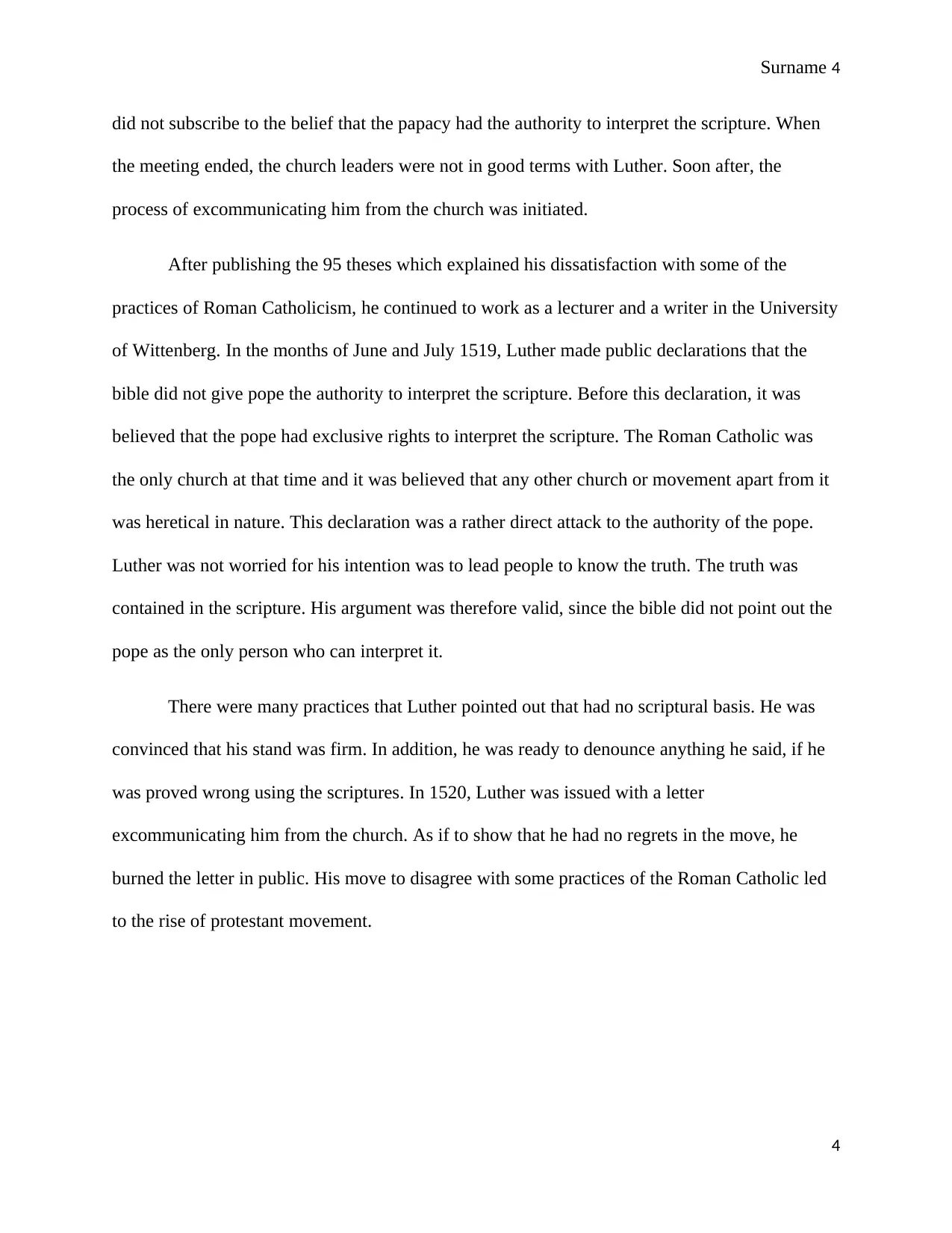
Surname 4
did not subscribe to the belief that the papacy had the authority to interpret the scripture. When
the meeting ended, the church leaders were not in good terms with Luther. Soon after, the
process of excommunicating him from the church was initiated.
After publishing the 95 theses which explained his dissatisfaction with some of the
practices of Roman Catholicism, he continued to work as a lecturer and a writer in the University
of Wittenberg. In the months of June and July 1519, Luther made public declarations that the
bible did not give pope the authority to interpret the scripture. Before this declaration, it was
believed that the pope had exclusive rights to interpret the scripture. The Roman Catholic was
the only church at that time and it was believed that any other church or movement apart from it
was heretical in nature. This declaration was a rather direct attack to the authority of the pope.
Luther was not worried for his intention was to lead people to know the truth. The truth was
contained in the scripture. His argument was therefore valid, since the bible did not point out the
pope as the only person who can interpret it.
There were many practices that Luther pointed out that had no scriptural basis. He was
convinced that his stand was firm. In addition, he was ready to denounce anything he said, if he
was proved wrong using the scriptures. In 1520, Luther was issued with a letter
excommunicating him from the church. As if to show that he had no regrets in the move, he
burned the letter in public. His move to disagree with some practices of the Roman Catholic led
to the rise of protestant movement.
4
did not subscribe to the belief that the papacy had the authority to interpret the scripture. When
the meeting ended, the church leaders were not in good terms with Luther. Soon after, the
process of excommunicating him from the church was initiated.
After publishing the 95 theses which explained his dissatisfaction with some of the
practices of Roman Catholicism, he continued to work as a lecturer and a writer in the University
of Wittenberg. In the months of June and July 1519, Luther made public declarations that the
bible did not give pope the authority to interpret the scripture. Before this declaration, it was
believed that the pope had exclusive rights to interpret the scripture. The Roman Catholic was
the only church at that time and it was believed that any other church or movement apart from it
was heretical in nature. This declaration was a rather direct attack to the authority of the pope.
Luther was not worried for his intention was to lead people to know the truth. The truth was
contained in the scripture. His argument was therefore valid, since the bible did not point out the
pope as the only person who can interpret it.
There were many practices that Luther pointed out that had no scriptural basis. He was
convinced that his stand was firm. In addition, he was ready to denounce anything he said, if he
was proved wrong using the scriptures. In 1520, Luther was issued with a letter
excommunicating him from the church. As if to show that he had no regrets in the move, he
burned the letter in public. His move to disagree with some practices of the Roman Catholic led
to the rise of protestant movement.
4
Paraphrase This Document
Need a fresh take? Get an instant paraphrase of this document with our AI Paraphraser
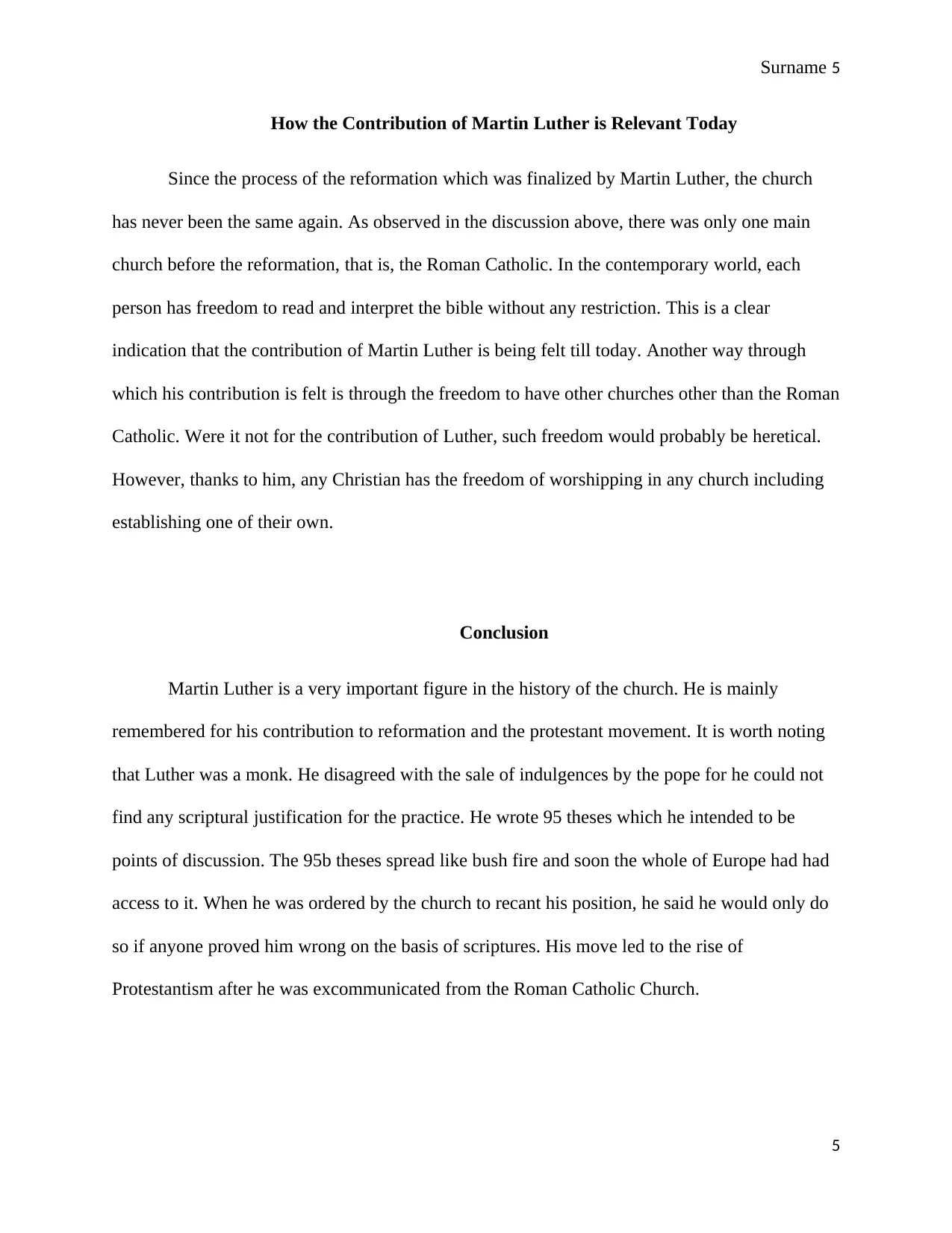
Surname 5
How the Contribution of Martin Luther is Relevant Today
Since the process of the reformation which was finalized by Martin Luther, the church
has never been the same again. As observed in the discussion above, there was only one main
church before the reformation, that is, the Roman Catholic. In the contemporary world, each
person has freedom to read and interpret the bible without any restriction. This is a clear
indication that the contribution of Martin Luther is being felt till today. Another way through
which his contribution is felt is through the freedom to have other churches other than the Roman
Catholic. Were it not for the contribution of Luther, such freedom would probably be heretical.
However, thanks to him, any Christian has the freedom of worshipping in any church including
establishing one of their own.
Conclusion
Martin Luther is a very important figure in the history of the church. He is mainly
remembered for his contribution to reformation and the protestant movement. It is worth noting
that Luther was a monk. He disagreed with the sale of indulgences by the pope for he could not
find any scriptural justification for the practice. He wrote 95 theses which he intended to be
points of discussion. The 95b theses spread like bush fire and soon the whole of Europe had had
access to it. When he was ordered by the church to recant his position, he said he would only do
so if anyone proved him wrong on the basis of scriptures. His move led to the rise of
Protestantism after he was excommunicated from the Roman Catholic Church.
5
How the Contribution of Martin Luther is Relevant Today
Since the process of the reformation which was finalized by Martin Luther, the church
has never been the same again. As observed in the discussion above, there was only one main
church before the reformation, that is, the Roman Catholic. In the contemporary world, each
person has freedom to read and interpret the bible without any restriction. This is a clear
indication that the contribution of Martin Luther is being felt till today. Another way through
which his contribution is felt is through the freedom to have other churches other than the Roman
Catholic. Were it not for the contribution of Luther, such freedom would probably be heretical.
However, thanks to him, any Christian has the freedom of worshipping in any church including
establishing one of their own.
Conclusion
Martin Luther is a very important figure in the history of the church. He is mainly
remembered for his contribution to reformation and the protestant movement. It is worth noting
that Luther was a monk. He disagreed with the sale of indulgences by the pope for he could not
find any scriptural justification for the practice. He wrote 95 theses which he intended to be
points of discussion. The 95b theses spread like bush fire and soon the whole of Europe had had
access to it. When he was ordered by the church to recant his position, he said he would only do
so if anyone proved him wrong on the basis of scriptures. His move led to the rise of
Protestantism after he was excommunicated from the Roman Catholic Church.
5
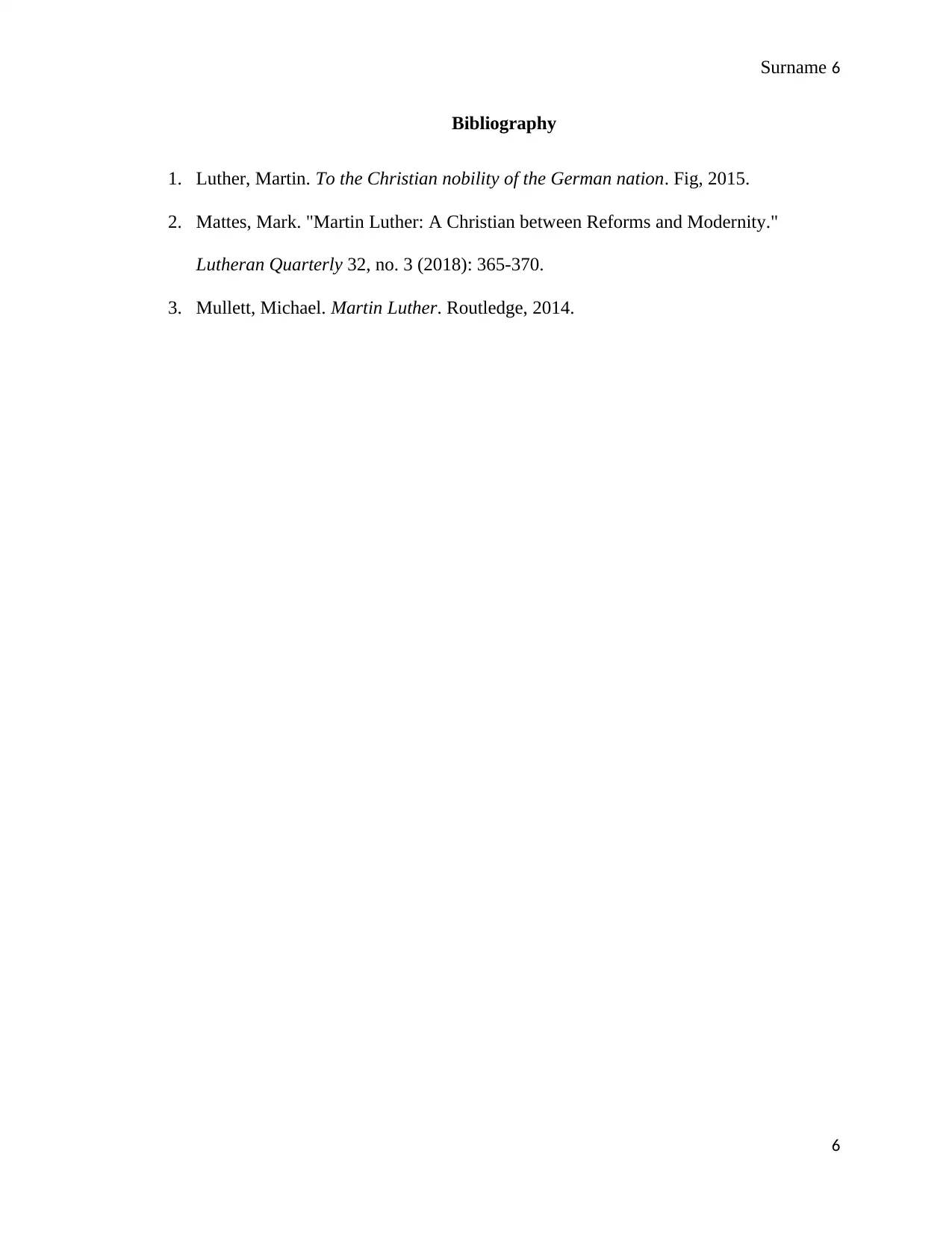
Surname 6
Bibliography
1. Luther, Martin. To the Christian nobility of the German nation. Fig, 2015.
2. Mattes, Mark. "Martin Luther: A Christian between Reforms and Modernity."
Lutheran Quarterly 32, no. 3 (2018): 365-370.
3. Mullett, Michael. Martin Luther. Routledge, 2014.
6
Bibliography
1. Luther, Martin. To the Christian nobility of the German nation. Fig, 2015.
2. Mattes, Mark. "Martin Luther: A Christian between Reforms and Modernity."
Lutheran Quarterly 32, no. 3 (2018): 365-370.
3. Mullett, Michael. Martin Luther. Routledge, 2014.
6
⊘ This is a preview!⊘
Do you want full access?
Subscribe today to unlock all pages.

Trusted by 1+ million students worldwide
1 out of 6
Your All-in-One AI-Powered Toolkit for Academic Success.
+13062052269
info@desklib.com
Available 24*7 on WhatsApp / Email
![[object Object]](/_next/static/media/star-bottom.7253800d.svg)
Unlock your academic potential
Copyright © 2020–2026 A2Z Services. All Rights Reserved. Developed and managed by ZUCOL.


